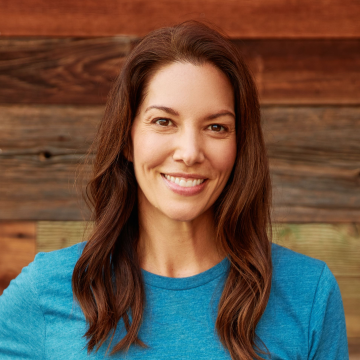There are six types of grit that are essential to achieving big goals. Believe it or not, one of them involves naps.
Need advice about something? Ask us here: ForcesOfEqual.com/Advice/
Learn more about Steven Kotler’s work here: https://www.stevenkotler.com/.
Learn more about Angela Duckworth’s work here: https://angeladuckworth.com/.
Transcript
Pam: [00:06] You’re listening to Not Bad Advice, where our goal is to offer perspective that helps you improve one aspect of your life at a time.
[00:13] I’m Pamela Lund.
CK: [00:20] And I’m CK Chung.
Pam: [00:22] And we hope that after listening you’ll think, ” Hey, that’s not bad advice!”
[00:32] I’m not a proponent of hustle culture or grinding. Or, honestly, working all that much. But I am an advocate for using your resources to achieve whatever will make you feel great. And most great things require work and time.
[00:57] There are tons of hacks and tricks to get more done in less time. But you’ll get better results when you train up your ability to just do what has to be done and your capacity to focus rather than relying on tricks.
[01:16] We are constantly being trained to focus less intently and for shorter periods of time, for example, growing up, watching television with commercials, train those of us that are over 30 to be able to focus for about seven minutes between commercial breaks. You can get a surprising amount of work done with seven minutes of intense focus, but bigger goals require more.
[01:39] So you have to train to combat that loss of focus. Just like as you age, you have to train to prevent muscle atrophy.
[01:47] To make consistent and meaningful progress towards your big goals, you need to train yourself to actually start working on the thing you need to do, to stay focused on that thing longer than you normally would, to be able to do what you need to do even when you don’t feel like it, and to keep going when you’re scared.
[02:09] So today we’re going to start a series of episodes about how to train these abilities, so you can do more than you think you can and do it faster than you think you can do it. So you can have more time to do whatever else makes you happy.
CK: [02:23] We’re not talking about replying to more emails or cramming more mundane work into your day. We’re talking about your passion. Your purpose. Whatever it is that you wish you were doing with your life.
[02:35] Doing what it takes to make that happen requires a different level of commitment and mindset, Psychologist and researcher, Angela Duckworth, posits that the secret to outstanding achievement is not talent, but a blend of passion and persistence. She calls this special blend “grit,” which is also the title of her book on the subject.
[02:56] Building on Angela Duckworth’s work on grit, Steven Kotler, one of the world’s leading experts on maximizing human performance, wrote in his book, The Art of the Impossible, that there are six types of grit, which are all essential.
[03:10] These are: the grit to persevere, the grit to control your thoughts, the grit to train your pain – in other words to be your best when you’re at your worst – the grit to train your weaknesses, the grit to master your fears, and the grit to recover.
Pam: [03:32] We’re going to have episodes that cover each of these types of grit to help you learn to develop them. But we’re going to start at the end with recovery because, frankly, we’re all a little exhausted. And if you’re exhausted, you can’t be at your best.
CK: [03:46] Also because you love sleep so much.
Pam: [03:48] Yes, sleep is one of my favorite things to do. Lucky for me, it’s also one of the best things you can do to recover. The type of recovery that we’re talking about isn’t what most people do to blow off steam. It’s not zoning out in front of a screen. It’s not getting drunk or eating a bunch of junk food. These things have their time and place, but they aren’t the type of recovery that is energizing and that can refuel you to take on your big goals.
[04:15] The type of recovery that we’re talking about is active, mindful recovery that you do on a daily basis. And that’s the reason it takes grit to recover. These things that are good for you and that repair your mind and body take more effort than bingeing, whatever your vice is.
[04:34] On the other end of the spectrum, if you’re someone that’s always burning the candle at both ends, it takes grit to slow down and let yourself recover. Or, if you’re the type of person that takes care of everyone else, first, it takes grit to commit to making your own recovery a priority.
CK: [04:51] Active recovery can include taking slow, walks, eating nutritious meals, spending quality time with loved ones, low intensity yoga, taking a bath, sitting in a sauna, getting a massage, getting a full night of sleep, or anything that relaxes you reduces your stress levels and refuels you without making you zone out and disconnect from your life.
Pam: [05:15] If you thought, “yeah, right, I don’t have time for that,” while listening to that list of recovery activities, you need it even more. Even when you love what you do and are excited about the work you’re doing, you have to build in breaks, or you will burn out. It’s much easier and faster to achieve the goal you’re chasing when you feel good and think clearly.
[05:39] And if anyone questions your afternoon nap, just tell them you’re building grit.
[05:48] This is usually the portion of the show where I relate a Tarot card to the message, but we’re going to try a few episodes without it. If you loved that part and miss it, let me know on Twitter.
[06:04] If you found yourself thinking, “Hey, that’s not bad advice,” while listening today, we’d love it if you shared the episode with your friends and rated it in iTunes.
[06:17] You can get in touch with us on Twitter, where I’m @Pamela_Lund and CK is @cKdisco.
[06:24] To find us on other platforms, visit ForcesOfEqual.com/Advice. There, you can also contact us if there’s something you need advice about. We’d love to hear from you.






